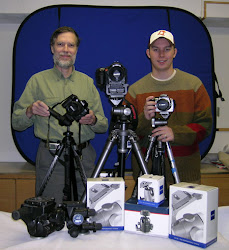Digital Cameras and digital camera phones have great advantages over traditional film cameras. The ability to take high resolution photographs, using a very compact device means that it is easy to always have a camera with you to capture both formal and reportage style pictures in any place at any time.
The quality of the camera is often based on the resolution, referred to as the number of megapixels, with the larger the megapixel count the better quality the image will be as the more pixels there are in the image, the more detail the camera can record.
Coupled with the improvements in resolution have come better quality lenses on the cameras and camera phones, improved editing software, sometimes built into the device, and removable memory cards that can store hundreds and is some cases thousands of pictures.
And of course with digital photography the results are instant. You click to take a photograph and can straight away see the results. If you don't like what you see, you delete the picture and try again, without the need to have a film processed and printed to find out the quality of your photographs.
Although this ability to easily record pictures is improving rapidly over time, there is still a gulf between how easy it is to take the photographs and getting them from the digital camera or camera phone so if you are like many people your photos stay on the device or memory card until you suddenly run out of room.
But what if you loose your camera or your phone is stolen, or if your memory card is accidently erased? All your pictures can be lost in an instant. It is therefore good practice to get in the habit of taking the photographs from the device and making sure you have a back up copy. These simple steps should help:
1. Regularly copy the images from your camera, mobile phone or memory card onto your computer. It is a good idea to set up a dedicated directory and then save the pictures into folders that mean something, for example Summer holiday in Florida. This way you can quickly find the pictures you want at a later date. This is also a good time to delete any that you will not want to keep, such as blurred photos or nearly duplicate images.
2. Back these up from your computer, either onto a CD or DVD disk or a portable hard drive. Ideally store this backup away from your main computer in case of fire or theft.
3. You may want to consider putting a back up of your favourite photographs to an online storage service such as Flikr.
4. Finally, don't leave your photographs sitting on your camera or hard disk but print your favourites to share and enjoy.
My Links : Cheap Green Cookware Store Best Cameras Digital Store Buy Furniture Stores







0 comments:
Post a Comment